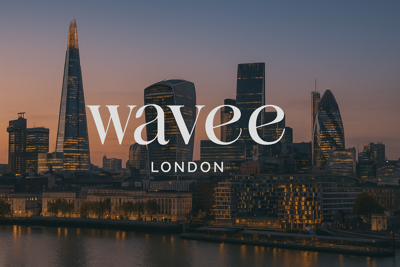
Cities often bring people together physically while separating them socially. A resident in London can share walls with dozens of others yet remain a stranger to nearly all of them. Trust in immediate neighbors has declined, even as reliance on digital tools has increased. Into that tension steps Wavee Ai, a PropTech company founded by Nikesh Panchal, which is presenting itself not only as a convenience app but as a reimagining of how city dwellers might rebuild the bonds of belonging.
The premise is straightforward. Residents use the free resident app Wavee Ai to manage parcels, receive visitor notifications, and connect with local businesses. Concierge teams benefit from a digital portal to log deliveries, track visitors, and communicate with residents, while local shops can subscribe to offer click-and-collect services, bookings, and promotions.
What distinguishes Wavee Ai is how it applies verification: every account is authenticated through the building, turning a simple step into the foundation for both trust among neighbors and confidence for businesses.
That foundation changes the way communities interact. People are more likely to speak openly in a space where identities are known and limited to those who truly live there. Local businesses advertise with certainty, knowing their promotions reach genuine customers rather than fabricated clicks. Conversations become more constructive because participants know they are engaging with neighbors who share the same lifts, hallways, and public spaces.
Keeping Connections that Matter
There is a deeper story here about what technology has done to communities. For two decades, platforms encouraged people to expand outward. The goal was global reach, connecting strangers across borders. That expansion brought new opportunities but also a creeping sense of isolation within one’s own block. Residents came to know people online in other countries better than the neighbor down the hall. Wavee Ai reverses that trajectory. It narrows the circle intentionally, asking technology to deepen the connections closest at hand.
The economic design reinforces that social vision. The resident app is free for residents and buildings. Unlike many software systems that charge property managers a subscription fee, Wavee Ai makes its revenue from businesses.
Cafés, gyms, dry cleaners, and service providers in the immediate area subscribe to the portal and gain access to verified local households. Residents receive relevant offers, and businesses spend marketing budgets efficiently, without wasting money on audiences who may not live nearby. The alignment of incentives supports trust on both sides.
The Wavee Ai Impact in Action
Wavee Ai has already reached several milestones that give substance to its claims. The company has raised more than £1 million in seed funding through a joint venture and private investors and has onboarded multiple London buildings, with dozens of businesses preparing to join the network. The company has also reported a current valuation of £10m, with expansion planned for Manchester, Birmingham, and Edinburgh. Singapore and Australia are emerging as priority international markets.
The cultural implications are significant. If Wavee Ai succeeds, it could reshape how residents think about digital neighborhoods. The platform would not only replace bulletin boards or group chats but also introduce a model of online living where trust itself becomes the product.
A future where residents vote on community matters through the app, businesses build loyalty through verified engagement, and concierges coordinate safety alerts between buildings feels less like science fiction and more like an extension of what the app is already offering.
A Bold Step to Innovation
Wavee Ai is off to a great start, yet the challenge will be scale. Verification requires cooperation with building management, and onboarding each property involves multiple stakeholders. Sustaining engagement will also require balancing commercial activity with genuine neighbor interaction.
If commercial messaging overshadows the social space, residents may disengage. If moderation falters, trust may erode. Panchal’s leadership will be tested on whether he can maintain that equilibrium as the platform expands from hundreds to thousands of buildings.
Still, the Wavee Ai vision taps into something many city dwellers quietly crave: reassurance that neighbors are more than anonymous figures passing in a corridor. By embedding trust into the structure of the app, Wavee Ai is not only offering a tool for property management but also articulating a philosophy of urban life. In an age when global networks dominate attention, the most radical idea may simply be to look next door.
Please visit Wavee Ai’s website for more information on its services.


(0) comments
We welcome your comments
Log In
Post a comment as Guest
Keep it Clean. Please avoid obscene, vulgar, lewd, racist or sexually-oriented language.
PLEASE TURN OFF YOUR CAPS LOCK.
Don't Threaten. Threats of harming another person will not be tolerated.
Be Truthful. Don't knowingly lie about anyone or anything.
Be Nice. No racism, sexism or any sort of -ism that is degrading to another person.
Be Proactive. Use the 'Report' link on each comment to let us know of abusive posts.
Share with Us. We'd love to hear eyewitness accounts, the history behind an article.